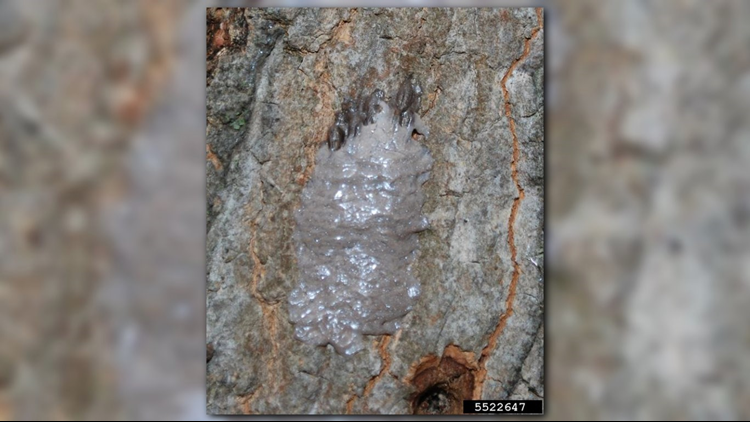PENNSYLVANIA, USA — As the temperature continues to cool, Pennsylvanians can expect to see fewer spotted lanternflies. However, this is far from the end of their life cycle.
The invasive species has spread rapidly throughout Pennsylvania after first being spotted in Berks County in 2014. Cooler temperatures bring temporary relief from the invasion, as adult spotted lanternflies die during the first frost.
However, their eggs can not only survive the first chill but the entire winter as well.
According to PA Weather Action, lanternfly eggs can survive on surfaces as cold as 12-14 degrees Fahrenheit.
This doesn't mean the eggs die as soon as the air temperature reaches that 12-14 degree threshold. The surface the egg mass is attached to, typically trees or outdoor furniture, must reach that specific low temperature for the eggs to die.
Temperatures vary greatly throughout the state. While higher elevations aren't suitable for spotted lanternfly eggs because of the extreme cold, the same cannot be said for York, Lancaster, Dauphin, and plenty of other counties across the Commonwealth.
According to PA Weather Action, it is rare for temperatures to drop below 12-14 degrees Farenheight for any longer than a few hours on the coldest days of winter.
Therefore, without human intervention, spotted lanternfly egg masses can survive the winter and have an even larger season in 2023.
The average female spotted lanternfly will lay one to two egg masses, each containing 30-60 eggs within their lifespan.
These masses are typically seen on trees, vehicles, and outdoor furniture. The masses can look like dried mud splotches.
Pennsylvanians have been encouraged to inspect their property for these masses. The adult egg-laying season runs from September through November. Those traveling this fall have been asked to check their travel times, including cars, for the egg patches.
It likely won't be rare to find the egg masses this fall, so if (or when) they are found, experts recommend scraping them into a plastic container of rubbing alcohol, sealing, and disposing of it.
Luckily, as many of Pennsylvania's valleys aren't very densely forested, their egg masses may be easier to spot.



